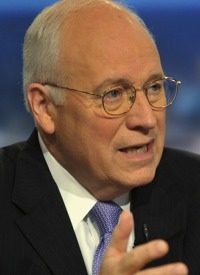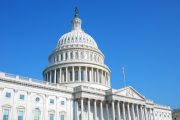
Whatever else may be said about Richard B. "Deadeye Dick" Cheney, the first Vice President since Aaron Burr ever to personally shoot a man, it may at least be said that while his eyesight and aim may be poor, his vision is not narrow.
At least it was not when he was Vice President and was heavily involved in the planning and waging of war in the Middle East. In his new book, A Journey: My Political Life, Former British Prime Minister Tony Blair recalls that Cheney wanted the the United States to go to war not only with Afghanistan and Iraq, but with a number of other countries in the Middle East, as he believed the world must be "made anew."
"He would have worked through the whole lot, Iraq, Syria, Iran, dealing with all their surrogates in the course of it — Hezbollah, Hamas, etc.," Blair wrote. "In other words, [Cheney] thought the world had to be made anew, and that after 11 September, it had to be done by force and with urgency. So he was for hard, hard power. No ifs, no buts, no maybes."
It is hard to suppress a gasp at the audacity of such a scheme to employ the military might of the world’s reigning superpower that the world be "made anew." Ronald Reagan was fond of quoting Thomas Paine’s statement, "We have it in our power to begin the world again." We don’t. And it is difficult, perhaps impossible, to come up with a more dangerous and more profoundly anti-conservative slogan.
"Over the years," wrote journalist and author Robert Parry in his Monday column on the Consortium News website, "there have been indications of this larger neoconservative strategy to attack America’s — and Israel’s — ‘enemies’ starting with Iraq and then moving on to Syria and Iran, but rarely has this more expansive plan for regional war been shared explicitly with the American public." Indeed, as Parry noted, the neo-con "joke" after the invasion of Iraq was, "Real Men Go to Tehran." Blair, who took a lot of political heat as Prime Minister for supporting the U.S. position on Iraq and bringing the United Kingdom into the coalition against Iraq, appears sympathetic to the Cheney agenda.
"I did not think [Cheney’s position] was as fantastical as conventional wisdom opined," Blair wrote. "It is one struggle. Our enemy has an ideology. It does threaten us. The ultimate answer is in the spread of democracy and freedom. It is even possible to conceive of this, in different language, as being a progressive position, certainly where removing someone like Saddam was concerned."
One might wonder how supposedly sophisticated and intelligent statesmen keep offering "the spread of democracy and freedom" as the panacea for the world’s ills. Is there any indication that countries are more or less peaceful to the extent that they more or less democratic? Did not the framers of our own Constitutional Republic warn us in The Federalist Papers that democracies end in chaos, bloodshed, and tyranny? Did not the election we championed in Palestine a few years ago result in the election of the Hamas Party? Where did we get the idea that democracy will make people less warlike? Has Great Britain been a peaceful nation? Are we?
Blair acknowledged that many in the West don’t take as benign a view of the former Vice President as he does. "To those on the left, he is, of course, an uncomplicated figure of loathing," Blair wrote. "Even for the middle ground, they tend to reach for the garlic and crucifixes. You have to go pretty far right to find Dick’s natural constituency."
It is interesting that at a time when numerous books and magazine articles are being published about America’s "hubris" and there is growing recognition of "the limits of power," we learn just how unlimited was Cheney’s concept — and undoubtedly that of others in the government at the time — of America’s military power. At a time when our military forces are stretched thin and soldiers are serving multiple tours in Iraq, we might wonder where Cheney thought we were going to get the manpower for war on the scale he envisioned. And how would we pay for it, since the Republican Party is wedded to tax cuts and we were already piling up a massive debt through our borrowing from sources both domestic and international?
It seems ironic now that when Vice President Al Gore ran against Gov. George W. Bush for President in the year 2000, the "risky scheme" Gore warned about was the Republican plan for partially privatizing Social Security. What has become terribly clear since then is that entrusting the Bush/Cheney gang with foreign policy was the most risky thing the American public had done in decades.
In previous eras, the Republican Party was anything but risky. It was the Democrats, and especially the New Dealers, who were enamored of novel and potentially risky schemes. But that was before Republicans, in the election of 1980, became the party of change and innovation and, in the process, became the party of massive national debt. By 1992, despite the record tax increase that President George H.W. Bush had signed two years earlier, deficits had become so huge during 12 years of Republican leadership that Bush was in no position to warn the American people how risky it might be to put the youthful Governor of Arkansas in charge of national government for four years.
It turned out to be eight years and Bill Clinton, adapting to the environment created by an ostensibly conservative Republican Congress, managed to steer the nation back toward fiscal sanity. Then came Bush ’43 and the budgets and deficits skyrocketed.
It is doubtful that most Republicans have yet realized the nature of the change that has come over their party. The American people have had a hard time coming to grips with the new reality of politics in the post-9/11 world. Once upon a time, being patriotic meant defending not only the flag, but the nation and the liberties for which it stands. Now patriotism is, more often than not, a thin disguise for jingoism.
The consolation for Americans and most of the rest of the world is that after eight years at the center of power, Bush and Cheney are finally out of office for good. It yet remains to be seen just how much "risky scheme" Barack Hussein Obama, winner of the Nobel Peace Prize, will affect us.



